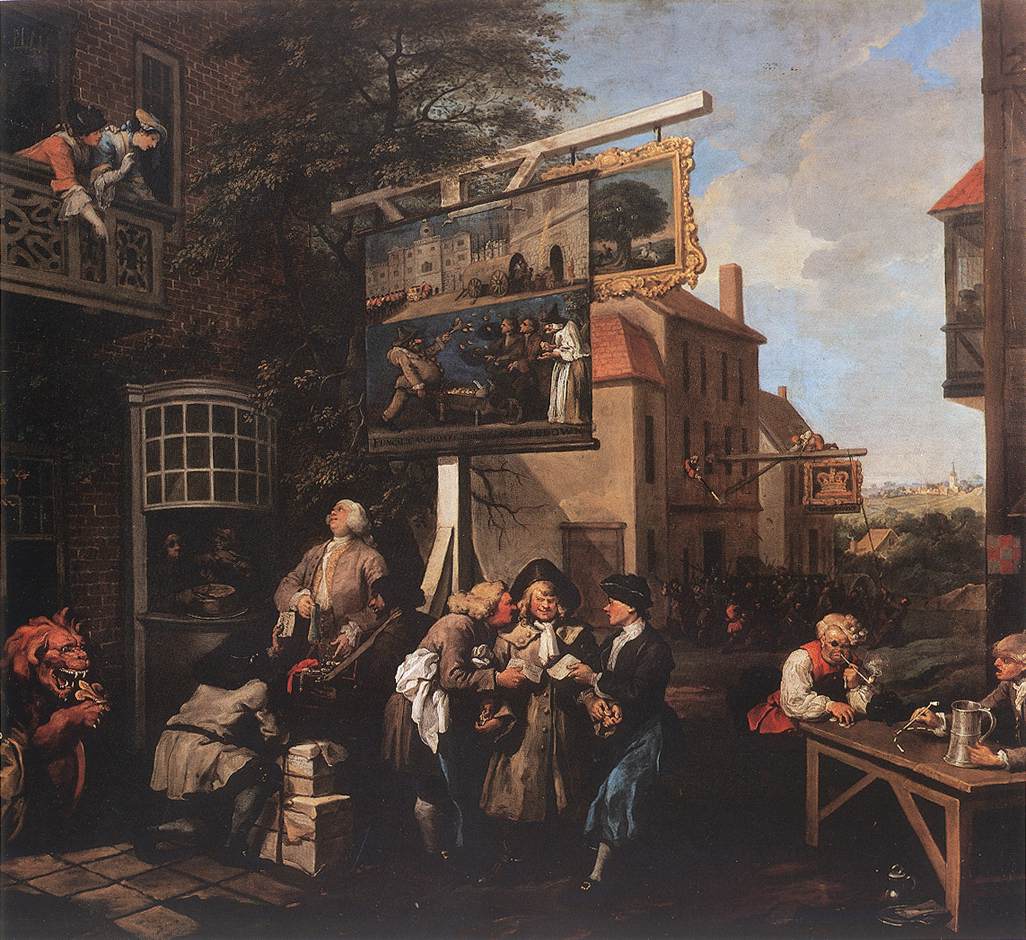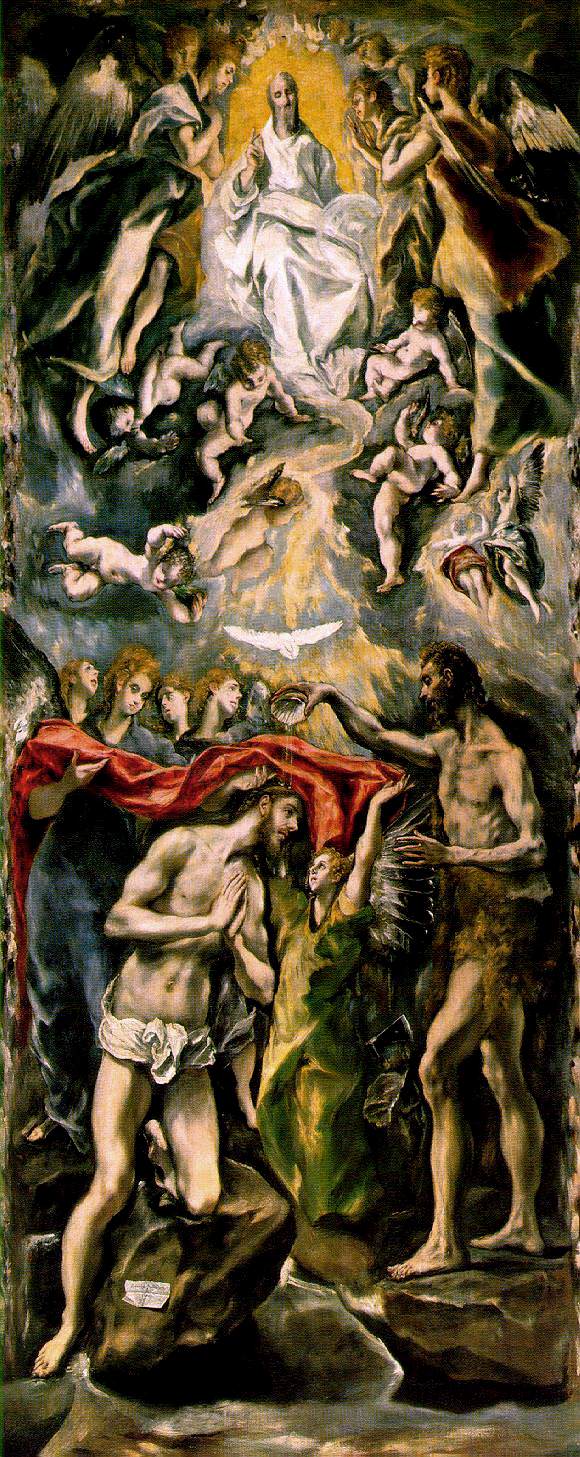
The Baptism of Christ, El Greco, 1596-1600
Museo del Prado, Madrid [Web Gallery of Art]
Readings (New American Bible: Philippines, USA)
Readings (Jerusalem Bible: Australia, England & Wales, India [optional], Ireland, New Zealand, Pakistan, Scotland, South Africa)
Note: In each of the above you will find an alternative First Reading, Responsorial Psalm and Second Reading that may be used in Year C. The Gospel below is always used in Year C.
Gospel Luke 3:15-16, 21-22 (New Revised Standard Version, Catholic Edition, Canada)
As the people were filled with expectation, and all were questioning in their hearts concerning John, whether he might be the Messiah, John answered all of them by saying, “I baptize you with water; but one who is more powerful than I is coming; I am not worthy to untie the thong of his sandals. He will baptize you with the Holy Spirit and fire.
Now when all the people were baptized, and when Jesus also had been baptized and was praying, the heaven was opened, and the Holy Spirit descended upon him in bodily form like a dove. And a voice came from heaven, “You are my Son, the Beloved; with you I am well pleased.”
A friend of my brother was asked about 25 years ago if he would mind playing a round of golf on a course near Belfast with a visitor from the European Continent. He agreed and the visitor was introduced as ‘Monsieur So-and-so’. Naturally, the two men got chatting and the Irishman asked his companion, ‘What do you do for a living?’ ‘Monsieur So-and-so’ smiled and said, ‘I’m the King of the Belgians’. It was indeed the late King Baudouin.
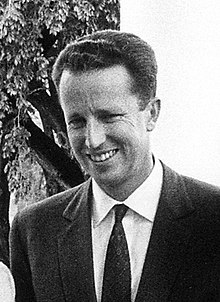
King Baudouin of the Belgians (1930 – 1993)
King Baudouin, a saintly man, often travelled incognito, as Leo Cardinal Suenens, the late Archbishop of Mechelen-Brussels, tells in his biography of the King, Baudouin, King of the Belgians, The Hidden Life. They sometimes went on pilgrimage to Lourdes together, the King driving. On one such occasion, the Cardinal recalled, they passed a wayside shrine of the Blessed Mother that had been vandalized. King Baudouin stopped the car and fixed the shrine.
While the video above, from Franco Zeffirelli’s 1977 TV miniseries Jesus of Nazareth, doesn’t follow St Luke’s gospel word for word, it does highlight one remarkable aspect of the baptism of Jesus – he lined up with sinners who wouldn’t have known who he was. He is God who became Man, utterly sinless, and yet he asks for baptism, which for John the Baptist was a sign of repentance. Let the same mind be in you that was in Christ Jesus, who, though he was in the form of God, did not regard equality with God as something to be exploited, but emptied himself, taking the form of a slave, being born in human likeness. And being found in human form, he humbled himself and became obedient to the point of death—even death on a cross (Philippians 2:5-8).
In the video St John the Baptist speaks the beautiful words of the Father to Jesus, You are my Son, the Beloved; with you I am well pleased. And when each of us was baptized the Father spoke the same words to each of us, his beloved sons and daughters. On one of the weekdays after Epiphany we hear at Mass these powerful words of St John: God’s love was revealed among us in this way: God sent his only Son into the world so that we might live through him. In this is love, not that we loved God but that he loved us and sent his Son to be the atoning sacrifice for our sins (1 John 4:9-10).
There at his baptism in the Jordan God’s love was revealed among us. What greater assurance can we have of God’s love?
King Baudouin wrote a letter in 1984 in response to one he had received from ‘someone who had written to him full or rebellion and indignation against everything that is even remotely related to religious or accepted ways of behaving’, as Cardinal Suenens put it. Here are some extracts from the King’s reply to this person.
When I was still a teenager, I discovered that God, in the person of Jesus, loved us and loved me with a love that is foolish, but very real. He suffered the most excruciating torture in order to save us, to save me, to save each one of us personally from the grip of evil, and to enable us to share, if we so will, in his divine life. That, if we accept him, his Father will become our Father, my Father. That Mary, his mother, will also become my mother, our mother.
From that day on my life changed. by that I mean my way of looking at things, because I’m afraid I’m still the same poor chap, with the same faults as before. but my weaknesses don’t discourage me any longer: on the contrary, they provide me with a reason for trusting totally in the all-powerful strength of my Father who is also your Father.
This is a king writing to one of his people, an angry young person who trusted him enough to write him. King Baudouin is taking the words of St John to heart: In this is love, not that we loved God but that he loved us and sent his Son to be the atoning sacrifice for our sins.
And in recognizing that he himself is still the same poor chap he is acknowledging that Jesus is not ashamed of him, no more than he was ashamed of the sinners he lined up with to be baptized by John, even if he himself was utterly sinless.

The Royal Palace in Laeken, near Brussels
King Baudouin wasn’t ashamed of his subjects or of those who came to his country from elsewhere. The London newspaper, The Independent, carried an astonishing story about his funeral (I’ve highlighted some parts):
A former prostitute paid an emotional homage to King Baudouin at the funeral Mass. One of a handful of people chosen to deliver orations, Luz Oral, a Filipino, praised the King for his fight against the international sex trade. She stood in silence as a writer, Chris de Stoop, read aloud the words she had written. Ms Oral had met the King when he paid a highly-publicised visit to a brothel in Antwerp, and De Stoop said both the King and Queen had wanted her to address the funeral. This was her homage.
Now my friend passed away, who else can help us? I come from Manila. My family is very poor. I was promised a nice job in Europe. But Belgian men put us in a sex club. Belgian men put us in prostitution. We cried and we refused. But nobody could help us. We were forced. We were treated like slaves. When I could run away, I was arrested by police. I had many problems.
Last year the King came to see us in Antwerp. We were five girls there. We cried again but it was different tears. The King was holding my arm. He listened to me. Only the King listened to us. He was shocked. There are too many victims here. From Manila. From Bangkok. From Santo Domingo. From Budapest. From eastern Europe. All looking for a better life in the West. All pushed into prostitution. The King was fighting against this sex trade. He was standing up for us. He was a real king. I called him my friend.
The first part of the video shows Luz Oral at the funeral of the King, the words she wrote being read by Chris de Stoop, a writer. This note comes with the video: ‘This is a small portion of the funeral of King Baudouin I of the Belgians from August 1993. It contains an interview of Journalist-author Chris De Stoop. He discusses the impact of Philippine, Luz Oral, a subject of De Stoop’s book about the trafficking of women into Belgium and the work done by King Baudouin and Queen Fabiola to help these women escape their sexual slavery bonds. Luz Oral writes a small eulogy of King Baudouin I/Boudewijn I and De Stoop reads the address at King Baudouin’s funeral. This small speech is in English while the other portions are in Dutch and French.’
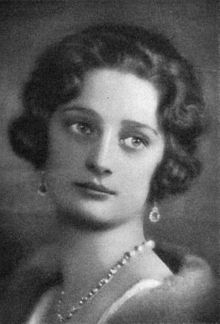
Princess Astrid of Sweden, Queen Consort of the Belgians (1905 – 1935)
King Baudouin, living his faith in Jesus Christ, brought hope into the lives of people on the margins, the hope that Jesus brought into the world by standing with us sinners in the River Jordan. The King himself had suffered much in his lifetime. His mother, Princess Astrid of Sweden, died in a car accident when he was only five. He, his sister and brother, with their father King Leopold III were under house arrest during World War II and spent part of it in Germany. In 1951 Leopold, a cause of bitter division in Belgium because of his surrender to Nazi Germany in 1940, abdicated and his elder son took over, not yet 21.

King Baudouin and Queen Fabiola
Queen Fabiola died on 6 December 2014 aged 86.
In 1960 the young king married Doña Fabiola de Mora y Aragón from Spain. To their great sorrow, they had no children. Queen Fabiola had five miscarriages.
In 1990 King Baudouin asked the government to declare him temporarily unable to reign so that he wouldn’t have to sign a bill legalising abortion. The government agreed. The King’s stand was one of principle, though he was unable to stop the law coming into force.
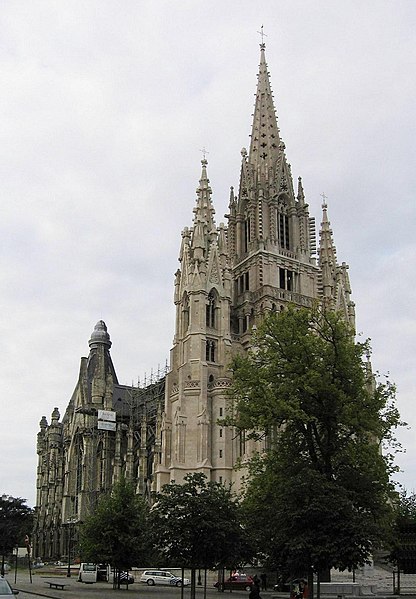
Church of Our Lady of Laeken where King Baudouin is buried
King Baudouin went to Mass every day and to confession regularly. The baptism of Jesus by St John the Baptist might spur each of us on to avail of the sacrament of reconciliation often and to us priests to make ourselves available for it. The King would write a ‘thought for the day’ in his pocket diary, a text from the Mass.
And in that diary, after his death, this prayer was found:
Lord, make us suffer with the suffering of others.
Lord, let us never again keep our happiness to ourselves.
Make us share the agony of all suffering humanity.
And deliver us from ourselves, if that is in accordance with your will.
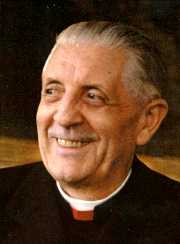
Leo Joseph Cardinal Suenens
(1904 – 1996)
Cardinal Suenens writes that Baudouin once confided to a friend his purpose in being King:
To love his country,
to pray for his country,
and to suffer for his country.
[Photos from Wikipedia and Wikimedia]
John 1:1-5 (New International Version)
John 1:6-34 (New International Version)
The narrator is David Harewood. The production is by the Lumo Project.

CHRIST IN YOU, OUR HOPE OF GLORY
Colossians 1:27
51st International Eucharistic Congress, Cebu, Philippines
24-31 January 2016
Website

